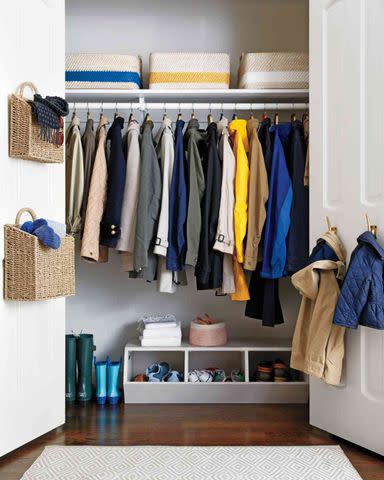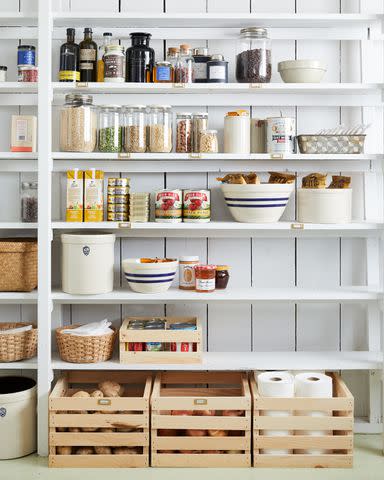8 Storage Mistakes That Are Keeping Your Home From Being Organized
If you want a tidy, organized home, steer clear of these common mistakes.

It's Sunday morning and you're in the mood to crack open that bread machine you received for Christmas a few years ago...if only you could remember where you put it. This all-too common scenario happens to the best of us, which is why it's important to have a good storage system in place. Keeping stored items organized not only makes it easier to locate something when you need it, but it helps keep your home tidy, and your items in good condition.
With just a few tips, you'll be well on your way to creating a storage system that works for you. We asked organizing experts to share the most common storage mistakes we all make—and for their tips on how to remedy the issues. And next time you're in the mood for homemade bread? You'll know exactly where to find the tools you need.
Related: 15 Clothes Storage Ideas That Will Transform Your Closet and Drawers
Buying Containers Before Having a Plan
Stocking up on storage containers and products might help you feel accomplished, but they'll only help if they meet your specific needs. "I often hear people say, 'I bought all these great organizing and storage containers, I don't know why I can't get organized,'" says Nicole Gabai, founder of B. Organized, and the author of The Art of Organizing: An Artful Guide to an Organized Life.
Storage systems should always start with a plan. How much space do you have? Do you need bins or baskets? "The smartest way to shop is first to determine exactly what you want to store, and how you're going to use or retrieve these items," says Gabai. "Only then should you set out to find something that will fit your needs."
Related: 15 Organizing Projects That Will Make You Feel Accomplished in Just 10 Minutes
Using Cardboard Boxes as Storage
Repurposing cardboard moving and shipping boxes might seem like an inexpensive and sustainable storage solution, but experts caution against using them for long-term storage, especially for clothes. "It is not advisable to store clothes in cardboard boxes as they can transfer the odor of cardboard and glue onto clothes, which can be difficult to remove," says Gabai. "Cardboard boxes also attract rodents." Instead, opt for large, opaque plastic bins with well-sealed lids.
...Or Plastic Trash Bags
A common mistake is to pack seasonal clothing or spare linens away in large trash bags for long-term storage, but textiles need to breathe and should be stored in a dry container, says Ashley Stewart, a professional organizer and owner of O.C.D | Organize. Create. Design. "Plastic bags prevent airflow and trap moisture that can cause damaging mold."
Under-the-bed storage containers are a better option for keeping seasonal pieces organized, protected, dry, and safe. The containers offer out-of-sight storage that keep clothes protected from dust and moisture, while allowing airflow.
Related: 10 Closet Organization Mistakes to Avoid, According to Experts

James Ransom
Failing to Assess Clothing Before Storing It
In the rush to make space, we might store items that are damaged, soiled, or don't fit properly. "Storing stained or soiled seasonal clothing long term is a mistake because the stain could set and ruin the item," says Stewart. "Storing soiled seasonal clothing can also attract unwanted pests and odors."
The key to successfully storing your seasonal wardrobe is preparation. "Make sure all items are properly cleaned, and look for pieces that are damaged, out of fashion, and the wrong size," says Stewart. "Items that are out of date or the wrong size can be placed in the donation or resale box."
Related: The 9 Best Places to Donate Clothes
Storing Something "In Case You Need It Someday"
You know that old iPhone box you hung on to? Random charging cables? Manuals for tech that you don't even own anymore? "Some items have a perceived value or a thought that you may need it someday," says Holli Humber, a professional organizer and owner of Holli K Co. "A good rule is if you haven’t used it in a year, you are not likely to."
Instead of saving that unused item, give it to a friend, donate it, or try to sell it, says Christina Giaquinto, professional organizer and brand ambassador of Modular Closets. You'll get the benefit of less clutter, and the item will go to someone who truly needs it.
Forgetting to Label Storage Bins
A storage system is only successful if you're able to locate items when you need them. "Not properly labeling boxes and containers can lead to a lot of wasted time during move-outs and when you are searching for an item you need," says Giaquinto.
Labels also make tidying up easier. "Most clutter is created when items do not have a designated home to return to," said Humber. "Labels that are detailed about what is contained in each bin are key. The more specific the label, the better (i.e., Christmas Outdoor Lights, 5T Summer Clothes/Shoes, Cold/Flu Medicine)."
Related: 20 Stylish Ways to Make the Most of Your Small Closet, According to Designers

Ryan Liebe
Not Utilizing Vertical Space
If you're not thinking vertically, you're missing out on valuable storage space. "Adjust the kitchen cabinet shelves for better access to dishes," said Humber. "If you have a garage shelving unit, see if the shelves can adjust to fit your totes." If you aren't able to adjust shelves to accommodate vertical storage, add risers or use stackable bins to utilize that unused space, Humber says.
Related: 19 Walk-In Pantry Ideas for a More Functional, Organized Space
Keeping Items for a Garage Sale That Isn’t on the Calendar
Garage sales are an effective way to get rid of items you don't need anymore, make some money, and give someone else the chance to enjoy your old items at a very low price. But there's a catch. "If you want to hold a garage sale to sell your old items, it is absolutely key to schedule the day and time you plan to hold it," says Giaquinto. "Otherwise, you may end up having to keep pushing the garage sale out as other obligations come up, all the while still holding onto a bunch of items cluttering up your space."
Related: Our Expert-Approved Guide to Planning Your Own Estate Sale in 8 Simple Steps
Read the original article on Martha Stewart.

